Memories


Related sites:
Life before August 1914
War starts
Life and Death
in Arborfield during the War
Arborfield Church and Rev. Joshua Anderson
Bearwood and the Canadian Convalescent
Hospital
The Remount Depot, Arborfield Cross
(actually, mostly in Barkham)
Life and Death
in Barkham during the War
Barkham Church and Rev. Peter Ditchfield
Fund-raising
Caring for the Refugees
Caring for the Wounded
From Volunteers
to Conscripts
The Revolution in Agriculture
Zeppelin Scares
Food shortages and rationing
Prohibition or Moderation?
Health Matters
The Weather
Berkshire County
Council
Trivia
Armistice Day and after
Adjusting to
Peacetime, 1919 to 1922
|
|
The Reading
Mercury and Arborfield, 1914 – 1918
How was life in Arborfield portrayed
in the local newspaper in WW1?
This set of topics is composed mainly of quotations from articles
covering Arborfield and Newland, the Remount Depot, Barkham
and Bearwood (by the way, the mansion is almost entirely within the old
civil parish of
Newland).
Inevitably, many articles cover the wider area, especially
Reading and Wokingham, and are included where it is thought that they
would have been noted by Arborfield residents. Several residents, including John Simonds
of Newlands, worked in Reading (he was the Borough Treasurer as well as a
local director of Barclays Bank); we know of at least one apprentice who worked
in Reading, until he went to the Front and lost his life there.
The text in the articles is more or less as published, but the
paragraph layout has been altered to make it more readable. Many articles
appeared as a single large paragraph.
Images are taken from the Classified and other Ads. Either follow the links on the left, or in the following
summary, to navigate through
this feature.

Arborfield and the Great War
Arborfield
in early 1914 was much as it had been in Edwardian
times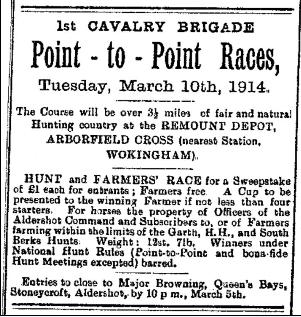 .
Half the 200-odd population lived or worked for the big houses. The
Remount Depot
offered both local employment and some entertainment; every spring, hundreds of
people flocked to Point-to-Point Races where local farmers and gentry
competed alongside Army officers from Aldershot. .
Half the 200-odd population lived or worked for the big houses. The
Remount Depot
offered both local employment and some entertainment; every spring, hundreds of
people flocked to Point-to-Point Races where local farmers and gentry
competed alongside Army officers from Aldershot.
John Simonds of 'Newlands'
commuted into Reading where he both managed Barclays Bank and acted as Borough
Treasurer. Mrs. Hargreaves of Arborfield
Hall took great interest in village life, throwing summer parties in the
grounds beside the River Loddon.
Captain and Mrs. Rickman lived at the Grange,
Mrs. Bruce at the Court, and Mrs. Walter at
Bearwood Mansion. While Arborfield Hall had hydro-electric power and
Bearwood its own gas-works, most villagers relied on candles, and drew water
from the well.
The Rectors of Arborfield and Barkham,
Joshua Anderson and
Peter Ditchfield, were familiar
faces in Arborfield, both visiting the Village School regularly. Many of
the school teachers had served for decades;
Mrs. Allright had taught there since the 1880’s, while young
Miss Edwards had been a pupil there, and
moved on to teaching before she was able to attend college. The school Summer
Party in July 1914 took place as usual in the grounds of
Arborfield Hall.
Other villages in Berkshire weren’t quite so lucky; summer events that
normally took place in August were abruptly cancelled as
war was declared. Men
immediately volunteered for the Front, while the civilians at the Remount
Depot became soldiers overnight, and there was a recruiting drive for
farriers and grooms in the local papers.
The local paper was the ‘Reading Mercury’, which carried reports from all
of the villages in and around Berkshire, including Arborfield and Barkham. It
was old-fashioned, with classified adverts on its front pages, and in 1914 it
never printed any photographs. Its rival the ‘Reading Standard’ was
always full of photos, and in Spring 1914, it had profusely illustrated features
on the new life to be found in Canada.
Later, the 'Standard' would encourage volunteers to serve by publishing photos
of the young men from ‘patriotic families’, such as the Clacey boys from
Finchampstead. Both newspapers reported on national and international affairs,
and increasingly on ‘our Boys at the Front’. As the War went on, they issued
lists of the wounded and killed, and reported on the wounded Canadian and other
soldiers being treated in Berkshire.
The local towns played host to hundreds of refugees from Belgium and France,
most of whom stayed for the duration of the conflict.
As the months extended into years, Reading became the focus for treating the
wounded – the old Workhouse was transformed into Battle Hospital. The
Reading V.A.D. group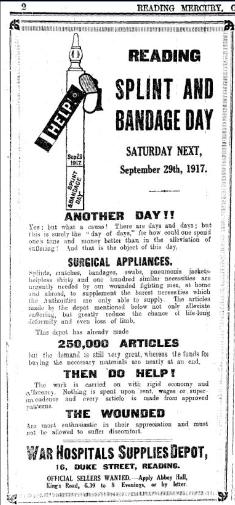 could transfer a whole train-load of walking-wounded and stretcher-cases to the
hospitals within an hour.
could transfer a whole train-load of walking-wounded and stretcher-cases to the
hospitals within an hour.
The town held ‘Splint and Bandage’
days, and the surrounding villages collected Sphagnum Moss to
make absorbent dressings.
There were collections to fund the ‘Berkshire
Room’ at the new ‘Star and Garter Home’ in Richmond, acquired by the
Auctioneers’ and Estate Agents’ Institute for the nation.
By 1915, London and some provincial cities were
being bombed by Zeppelin airships, and
insurance
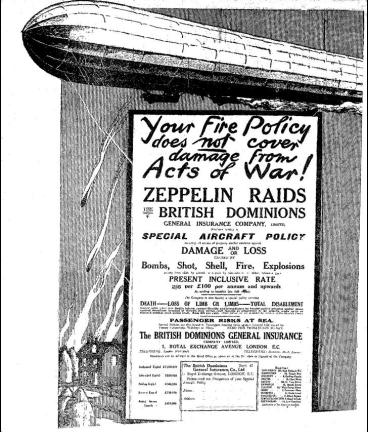 companies
spotted a gap in the market. Large adverts appeared in the ‘Mercury’, pointing
out that normal house insurance didn’t cover enemy attack. companies
spotted a gap in the market. Large adverts appeared in the ‘Mercury’, pointing
out that normal house insurance didn’t cover enemy attack.
On the night of 6th March, Reading was on
full alert, but the Zeppelins headed elsewhere and the town was spared.
Both the towns and the countryside had to be partially blacked-out, just in case
of attack. However, this caused more casualties than enemy bombing.
Ralph Pomeroy Simonds, who grew up
in Farley Hill and farmed in Surrey, was killed in the dark when he skidded on
his motorcycle trying to avoid a pedestrian. His funeral took place at
Arborfield Church.
Bearwood Mansion was taken up by the Army in late 1914 and assessed for
its suitability as a hospital. It played host to thousands of wounded soldiers
in its role as
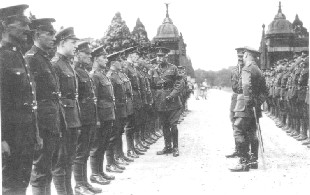 the Canadian Convalescent Hospital.
At one point 900 wounded soldiers were there, some almost fit enough to return
to the Front. Certainly, several were fit enough to form a formidable football
team, aided by the Vicar of Bearwood (and also the hospital Chaplain) Major
Bayley, who scored over 100 goals for them in the 1917-18 season. The team
also had a Nottingham Forest footballer from the hospital staff. In addition,
they played baseball at Elm Park, home of Reading Football Club. the Canadian Convalescent Hospital.
At one point 900 wounded soldiers were there, some almost fit enough to return
to the Front. Certainly, several were fit enough to form a formidable football
team, aided by the Vicar of Bearwood (and also the hospital Chaplain) Major
Bayley, who scored over 100 goals for them in the 1917-18 season. The team
also had a Nottingham Forest footballer from the hospital staff. In addition,
they played baseball at Elm Park, home of Reading Football Club.
The Canadian soldiers, both staff and patients,
frequented the village pubs in Arborfield. In 1916
Mrs. Clark, landlady of the
‘Swan’, was summoned to appear in court for
serving Canadian wounded soldiers with alcohol, which was strictly
against the law. P.C. Prior had arrested three Canadians, one so drunk
that he was temporarily legless and had to be taken back by ambulance. The case
was thrown out because the patients had unstitched the armlets that identified
them as wounded, and so the pub staff weren’t to know.
Meanwhile, Trooper Alfred Duffield, on
the staff of Bearwood Hospital, had been courting
May Bushell, daughter of the Landlord
of the ‘Bull’. They married at Arborfield Church in June 1917.
The same month, Dolly Powell, from
the Lodge at Arborfield Hall, married Ernest Finch at Arborfield. Mrs.
Hargreaves gave presents to both couples, and even hosted the reception at the
Reading Room in Church Lane for Dolly and her husband. May Bushell’s wedding
reception couldn’t fit into the ‘Bull’, so they used a marquee on the Garrett
Brothers’ meadow opposite.
The Church had long been concerned about the
effect of alcohol on soldiers. The
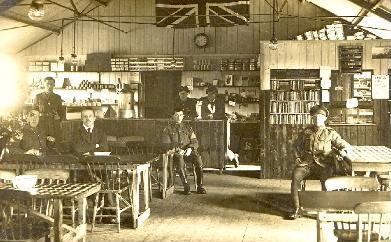 Y.M.C.A.
provided a recreation hut at Bearwood and laid on entertainment, as an
alternative to the attractio Y.M.C.A.
provided a recreation hut at Bearwood and laid on entertainment, as an
alternative to the attractio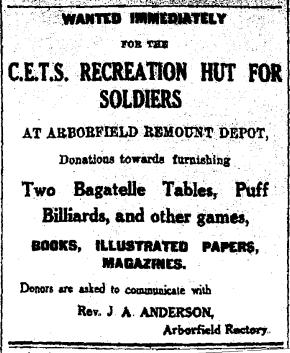 ns
of local public houses, while the Church of
England Temperance Society erected a similar hut at the Remount Depot,
opened by Mrs. Stuart Rickman, who had come down from her London house for the
occasion. ns
of local public houses, while the Church of
England Temperance Society erected a similar hut at the Remount Depot,
opened by Mrs. Stuart Rickman, who had come down from her London house for the
occasion.
By late 1917, there was talk of possible
Prohibition, with packed meetings in Reading Town Hall to hear speakers
from Canada, which was to be ‘dry’ for the duration of the war, and the USA,
where 27 States had already imposed Prohibition, destined to last well
into the 1920’s. England escaped with stricter licensing laws, weaker beer and
earlier closing times.
The villagers did their bit to grow more fruit
and vegetables, but unlike some of its neighbours, no areas were provided for
Allotments. Also unlike Swallowfield, Barkham and the Remount Depot, the village
didn’t run a ‘Rat and Sparrow Club’, which paid a bounty for each one
killed; rats and sparrows were seen to compete for grain.
Food became very scarce in Reading partly due to the large number of
wounded and
refugees, and by January 1918 there was so little meat that the butchers had to
close on Mondays, Tuesdays and Wednesdays.
Food rationing was introduced amid scenes of near-riots in West Street,
which only calmed down when the Mayor commandeered a tram from which to address
the crowds.
From at least 1916, the Remount Depot held summer
Sports Days where all the
villagers were welcome to attend and compete. Some of the soldiers had an
advantage; the prize for kicking the football for the furthest distance was won
by Sergeant Steer, in peacetime a Chelsea international player. By
1917 the Sports Days included fruit and
vegetable competitions to encourage gardening, and in
1918 there were Rabbit and Goat
Shows, again to encourage villagers, this time to keep livestock.
Bearwood also held Sports Days,
including swimming races in the lake.
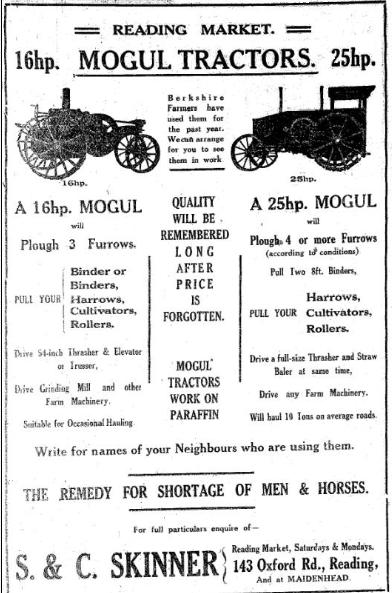
Agriculture had to change because of
the shortage of labour. Women started working on the farms, and local firms
started selling tractors, allowing farmers to save on scarce labour.
The Army
offered soldiers from the Reading barracks as temporary agricultural workers.
It was all change in the big houses, too:
Mrs.
Walter died at Bearwood;
Mrs.
Hargreaves died at Arborfield Hall.
Mrs. Bruce sold Arborfield
Court, while
Mrs. Stuart Rickman sold
Arborfield Grange.
Arborfield Hall was put up for
auction in 1919, as was Carter’s Hill Farm.
Some of the Farm was sold on to Berkshire County Council to form
smallholdings for returning soldiers. There were
two at Betty Grove Lane.
A notice about ‘eggs for wounded soldiers and sailors’ appeared
weekly for most of the war and into 1919. The scheme was based at Hartley Court, home of Mrs. Max de Bathe, in Three Mile Cross, and it hosted
several fund-raising events. Other country houses also assisted the war effort,
producing 'Anti-Vermin Garments'
for the troops at the front.
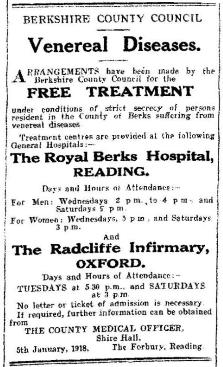 This advert in January 1918 would have caused shock-waves. It announced that
people could attend free clinics for Venereal Diseases at the Royal Berks
Hospital. The advert was followed in Spring 1919 by several
similar notices as the soldiers were de-mobbed. This advert in January 1918 would have caused shock-waves. It announced that
people could attend free clinics for Venereal Diseases at the Royal Berks
Hospital. The advert was followed in Spring 1919 by several
similar notices as the soldiers were de-mobbed.
Reading was hit by ‘Spanish Flu’ in late October 1918, and again in February
1919. On March 1st 1919, the ‘Mercury’ reported 23 deaths in the previous week
from influenza and pneumonia.
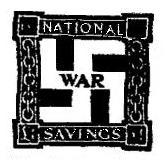
A series of 13 adverts for National War Savings in late Summer 1918 would have
caused no controversy at all. Its symbol was a swastika – but this didn’t
acquire a sinister meaning until the Nazis hi-jacked it 15 years later.
Armistice Day on November 1918 was the cause for thanksgiving and celebration.
Church bells and factory hooters made a tremendous noise. The following Friday
there was a torchlight procession from the Remount Depot to Arborfield Cross,
where there were fireworks, a bonfire and a mock trial of ex-Kaiser Bill and the
ex-Crown Prince. Adjustment to peacetime
conditions took far longer.
Early in 1920 Mrs. Rickman came out from London for the unveiling of the new
War
Memorial at the Cross, helped by John Simonds & Rev. Anderson.
Back to Memories Page

|
The 'Reading Mercury' and the 'Berkshire
Chronicle' were very conservative in their formats. The 'Mercury'
consisted of 12 pages, which shrank to 8 during the early war years because of
paper shortages. There were line drawings, but no photographs until very late in
the war.
There was another more populist newspaper,
the 'Reading Standard', which in contrast was filled with photographs
both before and during the War, and especially featured cameo pictures of soldiers volunteering,
mentioned in dispatches, wounded or killed.
The 'Reading Standard' produced a hard-back
commemorative series after the War, which can be seen at the Reading
Local Studies Library, and is now available in CD form from the
Berkshire Family History Society.
|









